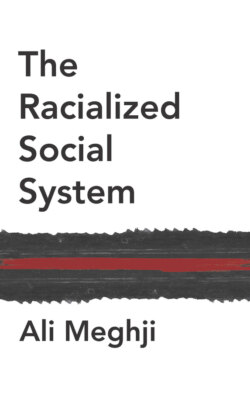The Racialized Social System

Реклама. ООО «ЛитРес», ИНН: 7719571260.
Оглавление
Ali Meghji. The Racialized Social System
Table of Contents
Guide
Pages
The Racialized Social System. Critical Race Theory as Social Theory
Copyright Page
Preface
Introduction: Critical Race Theory as Social Theory
The roots and routes of critical race theory
A ‘legal’ definition of CRT?
From a movement to a theory?
What is theoretical about critical race theory?
The racialized social system and practical social theory
Why does theory matter?
Towards the racialized social system approach
Internationalizing CRT: looking for the racialized social system approach
Chapter overviews
Notes
1 The Racialized Social System and Social Space: Racial Interests and Contestation
Defining the racialized social system: from ‘the state’ to ‘the structure’
Reflections on social space
The racial and the relational
The race for meaning
Relating ‘race’ to place
Contesting ‘race’ in social space
The trap of ‘racial conflict’ in the race relations model
Racial contestation beyond ‘race relations’
From racial contestation to racial interests: racial realism and the wages of whiteness
Racial realism or racial progress?
Maintaining an interest in whiteness
From racial interests back to racism
Notes
2 Racial Ideologies and Racialized Emotions: Seeing, Thinking and Feeling Race
Racial ideologies: from deception to perception
Colour-blind ideology in practice
Activating ideologies through emotional constellations
Emotions, ideologies and political conjunctures
Structures and individuals in racialized social systems
Notes
3 Theorizing the Racialized Interaction Order
The interaction order: from Goffman to the Black sociological tradition
The racialized interaction order
Interaction orders of non-interaction
The interactive making of race: micro aggressions, everyday racism, and racial action
Activating controlling images in the racialized interaction order
From controlling images to white habitus
Interactional cogs and the racial structure
Notes
4 Meso Racial Structures and Racialized Organizations. The vague promise(s) of analytical sociology
What are racialized organizations and what do they do?
From North American healthcare to Brazilian sugar mills
Racialized organizations and agency
Sport, racialization and agency
Workplaces as racialized organizations
Racialized organizations and the unequal distribution of resources. Moving to the top?
Cultural industries, racial grammars and racialized imagery
Notes
Conclusion: What is Critical about Critical Race Theory? What about … ?
A global racialized social system?
The flexibility of the racialized social system approach: from DesiCrit to TribalCrit and BritCrit
Why CRT and not RT?
Why do we need CRT now?
CRT and the environment
CRT, the ‘racial justice as diversity training’ industry and the crisis of white liberalism
The hierarchy of racism(s)
Critical race theory and the quest for justice
Notes
References
Index
POLITY END USER LICENSE AGREEMENT
Отрывок из книги
Ali Meghji
From my narrowed windows I stare into the night that looms beneath the cloud-swept stars. Eastward and westward storms are breaking, – great, ugly whirlwinds of hatred and blood and cruelty. I will not believe them inevitable. I will not believe that all that was must be, that all the shameful drama of the past must be done again today before the sunlight sweeps the silver sea.
.....
After Delgado and Stefancic’s scholarship in legal studies, CRT proliferated in US education studies throughout the 1990s and 2000s. The same year these books were published, Ladson-Billings and Tate (1995) wrote a paper entitled ‘Toward a critical race theory of education’, with Solórzano (1997) further opening the field two years later in the paper ‘Images and words that wound: Critical race theory, racial stereotyping, and teacher education’. By this period of the late 1990s, CRT was rapidly growing its own canon in education studies, leading to William Tate’s (1997) review piece ‘Critical race theory and education: History, theory, and implications’. Edited collections on different applicants of CRT in US educational research then became the norm, with a 1998 Special Issue on ‘Critical Race Theory in Education’ in the International Journal of Qualitative Studies in Education (Parker et al. 1998), Parker et al. (1999) co-editing Race Is … Race Isn’t: Critical Race Theory and Qualitative Studies in Education,17 Ladson-Billings (2003) editing Critical Race Theory Perspectives on the Social Studies: The Profession, Policies, and Curriculum, and Dixson and Rosseau (2006) co-editing Critical Race Theory: All God’s Children Got a Song.18
While this ‘new wave’ of CRT scholarship was based in educational studies, it was fundamentally shaped by the key tenets of CRT that Delgado and Stefancic formed from its application in legal studies. Take, for instance, Ladson-Billings’ use of CRT in education studies. In her canonical paper ‘Just what is critical race theory, and what’s it doing in a nice field like education?’ she directly applies each of Delgado and Stefancic’s five tenets of CRT to the field of education. Firstly, she draws on the ‘unique voice of color’ in her autobiographical reflections, claiming that this helps because ‘storytelling is a part of critical race theory’and that these stories can help ‘underscore an important point within the critical race theoretical paradigm, i.e. race [still] matters’ (Ladson-Billings 1999: 8). Secondly, she argues that racism is an ‘ordinary’ feature of the educational system which serves the purpose of maintaining the racial status quo. She demonstrates this by focusing on how, for instance, whites have been the primary beneficiaries of affirmative action in hiring within educational institutions, and how through biased curricula, teacher stigmatization, biased assessments, residential segregation and unequal school funding, Black folks face a significant deficit in the US education system. While many recast resulting educational inequalities through the lens of cultural racism – arguing that Black people do not care about education – Ladson-Billings (1999) thus stresses the need for counter storytelling: to unearth the structural inequalities in the education system to reject myths of Black inferiority. Indeed, given that even the CRT scholars in legal studies looked at issues like educational segregation, it is no wonder that there was such a synergy between legal and educational CRT scholarship at the turn of the twenty-first century.
.....